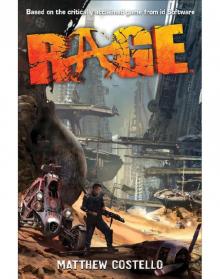- Home
- Matthew Costello
Beneath Still Waters Page 22
Beneath Still Waters Read online
Page 22
would be good—”
Russo shook his head. “We’ll start here. ”
Okay, Dan thought. It’s your boat.
He peeled off his T-shirt—gooseflesh rising—and
pulled on his wet suit. There were a few cracks in the rub-
bery suit that exposed his skin to the water. The fins felt
slimy, almost lizardlike.
206
m a t t h e w j . c o s t e l l o
“Give me a hand with these tanks,” Dan said.
Russo picked up the twin tanks and held them while
Dan put his arms through the straps.
“Good,” he said, and he pulled the straps in front of him,
making everything tight before buckling it. He reached
down and picked up his weight belt.
“Wish we had that radio,” Russo said.
“You and me both.” Dan put his face mask on his fore-
head and gave his regulator a test by sucking on it.
“All set?” Russo asked.
Dan nodded. He slipped the mask down and sat on the
edge of the boat.
( Fool. Why the hell am I doing this? Never was one for
good judgment. )
He glanced over at Billy Leeper, standing on the shore,
looking suddenly so all alone. The two cops were in the
roadway talking to the crew working there.
And he was worried. But not for himself.
For that old man who shouldn’t have come back here.
He flipped himself back, curling sleekly into the water.
Joshua woke up all in an instant and did what he did every
morning. He left his room quietly, moved even more qui-
etly past his mother’s bedroom, and walked down to the
family room. And the TV.
If he did it all quietly enough—just like a mouse—he’d
get to watch cartoons, maybe two shows before his mom
woke up. Thundercats, then GI Joe—his favorite.
Except his mom hated the show, actually told him that.
“I hate that program. It’s just a bunch of stupid violence.”
He didn’t know what violence was, but if it was what
made GI Joe so super, he was all for it.
He sat Indian-style in front of the TV, enjoying the toy
and candy commercials almost as much as the program.
It wasn’t until Thundercats ended that he noticed that
b e n e a t h s t i l l w a t e r s
207
the great sliding door leading to the backyard wasn’t quite
right. No, for one thing, the funny red light was off. Usu-
ally his mom did that, flipping it off as she said, “No more
TV, mister.”
And the door was open. Just a crack. But the light showed
green.
A few thoughts ran through his head. Was his mom up
already? Or maybe his sister was up? Or . . . or . . .
But then GI Joe began with the Joe Team blowing up one
of Cobra’s sky tanks, and Joshua gave up on the problem.
When Joe ended—and he still hadn’t heard his mom
walking around upstairs—he became a little curious. He
got up during a Jem, Queen of the Teenage Rockers
commercial—yuck!—and walked over to the sliding door.
Outside, it was foggy and misty, like in one of his dad’s
spooky movies that he wouldn’t let Joshua watch. He could
barely make out the trees, and the backyard looked cold
and wet.
He put all his weight against the door. It didn’t want to
move, but he dug his small feet into the tightly woven rug
and pushed even harder. It jerked forward an inch or two.
But it wouldn’t close.
And all of a sudden Joshua wanted to find his mom. He
ran upstairs, calling her name, his voice growing louder
with each step.
(All the time expecting her to just be there, a frown on
her saying, “Josh, what have you been watching?”)
“Mom!” He reached the hall and ran to her room. Her
door was open and her bed empty. She’s up real early to-
day, he thought. Real early.
“Mom,” he said now, quietly. “Mommy?”
The house was still.
Then he heard voices from downstairs. He took a step
out of the room. Right into someone.
“Josh, what’s all the noise, for Pete’s sake? You woke
me up.”
208
m a t t h e w j . c o s t e l l o
“Where’s Mom?” he demanded of his sister.
“Mom? You probably woke her up, you ding-dong.
Mom?” she said quietly, peering into the empty room.
Samantha looked at the bed, then at Joshua. “You’re
going to get it from her, buster.” She turned sharply
around and walked away from Joshua.
He watched his sister enter the kitchen, throw the light
on, her voice now calling out loudly, “Mommy!” When no
one answered, she turned back to Joshua.
He walked down the hall slowly, the TV’s voices from
downstairs growing louder.
“The door downstairs was open,” he said, biting his
lower lip, not liking the way his sister’s face looked. “It was
open, and the red light was off.”
Samantha came close to him, and he was glad.
He looked up at her, not really so much taller despite
her two years.
“We should,” he said slowly, “go look for her.”
Samantha took his hand.
Claire was up early and in her mother’s room, negotiating
even before her mother had her eyes open.
“Mom, I won’t be any problem. I’ll bring along tons of
books and I’ll sit in the car if you want me to and . . .”
Her mother crawled out of bed, looking past Claire as
she made her way to the bathroom. She shut the door, and
Claire came behind it and raised her voice a bit to get past
the wood.
“So what do you think? Can I go with you today? Skip
camp? Huh? Huh?”
“Claire, can’t I pee in peace?”
“Sure,” Claire yelled back. “Sorry, Mom.”
She backed away from the door a token few feet and
waited for Susan to come out again. She heard the toilet
b e n e a t h s t i l l w a t e r s
209
flush, then the sound of water running in the sink. After an
eternity or two, her mother came out, her eyes now open
and staring right at Claire.
“Not today. Besides, I paid a lot of money for that camp,
which I’m not about to see wasted.”
Her mother breezed past her and rattled around the
closet for some clothes. Claire never tired of watching her
mother dress—the way she went from some crumpled, hot,
frizzy-haired sleeping monster into someone beautiful.
I’ll never be like that, she knew, no matter how many times I watch.
And she knew she wouldn’t tell her mom the reason—
the real reason—why she didn’t want to go to camp. That
worried look was in her mother’s eyes a lot lately, when-
ever they talked of Claire’s dreams.
How could she tell her this, that the lake at the Kenicut
Reservoir was the same lake? The same lake from her dream!
And that she knew, really knew, that it was dangerous.
(Did she sleep last night? she wondered. Did it touch
her as she sle
pt?)
She didn’t want her mother going there alone. No, she
was wise to the lake and its tricks now . . . the way it had
almost snagged Joshua. The way it had probably snagged
the others.
And it wasn’t going to get her mother.
No way.
“I’m sorry, Claire, but I’ll be talking to people all day,
the police, other people. It wouldn’t be right.”
Claire began to perform. First a simple tear formed and
rolled down her cheek. Then it became easier. “But . . . but
I’ll be scared to be away from you. I’m so scared by my
dreams, Mom. Please don’t make me go to camp.”
Her mother took a step closer and ran her hand along
her daughter’s cheek, catching a tear. “Claire, baby, don’t.
They’re just dreams . . . just silly—”
210
m a t t h e w j . c o s t e l l o
Claire threw herself at her mother. She clutched her
tightly, sobbing now, on cue. She’d have to be the witch
from “Hansel and Gretel” to send me away now.
“Stay home,” Claire pleaded.
“I . . . can’t, honey. I’m writing a big story.”
She looked up at her mother’s face. “Then take me with
you.”
Her mother looked right back, her eyes filled with a
funny pain. They were all milky and confused. She ran her
hand through Claire’s hair.
“Okay, sweetheart, you can come.” She pulled Claire
tight, squeezing her in a great bear hug. “You can come,”
she held Claire away. “But I warn you, it’s going to be
mighty boring, and you’ll be stuck inside the car a lot.”
“Well, at least we can do lunch together,” Claire said,
permitting herself a small grin.
Her mother smiled back. “Yes, we can ‘do lunch.’ Now
go pick out something nice to wear.”
“I’ll be back in a few minutes,” Claire said, running to
her room.
There, she thought. For the first time she could breathe almost normally. There. At least I’ll be able to save my mom.
It was everyone else that was in danger now.
Herbert Blount was an early riser. In fact, on the regular
mental-health days he took off from his job, he’d often
sleep in until eleven, or, God, even twelve.
So now why the hell was he up at seven a.m.?
He stepped out onto his porch. He sipped his coffee,
stronger than his wife would ever make it. Just a small sip,
savoring the warm, burning sensation on his lips, his
tongue, and then down his throat. It was nice and hot.
And that’s when he noticed it.
Not the dam, though they seemed pretty active up there
for so early an hour. The banner was nearly completed. (Just
b e n e a t h s t i l l w a t e r s
211
the word falls was missing, the year 1989, and the last few
letters of the word celebration. Then it would be all done,
as big as a building.) And there seemed to be workers mov-
ing stuff from a truck onto the dam.
More paraphernalia for the celebration, he figured.
But that’s not what he found, well, peculiar.
It was cool.
Sure it could be a little cool, up here away from the city,
on a midsummer’s morning. It happens. But by seven the
sun—even through the clouds—usually had things warmed
up a bit. And the weather report for Westchester, which he
watched every night on the Weather Channel, was for a real
hot, muggy day. Overcast and humid.
Except that it seemed damn cool out here, standing on
his porch. He almost could use a sweater.
But despite the chill, he just sat down on his Adirondack
chair, sipped his scalding coffee, and watched the curious
activity on top of the wall of the Kenicut Dam.
PART THREE
E I G H T E E N
“You haven’t eaten a thing.” Edith Rogers sat down at her
small butcher-block kitchen table, facing her husband. “It’s
just not like you to skip breakfast.”
Paddy Rogers pushed his chair away from the table, away
from his I-can’t-believe-it-’s-not-buttered toast, melon, and
bowl of Special K. He took a sip of his coffee.
“Just not hungry. Not today.”
He hoped his wife would back away, just let him sit
there a few more minutes, think about things, try to figure
something out.
She had a napkin all twisted in a knot around her bony,
wrinkled hands—once so soft and beautiful, now ravaged
by arthritis that she rarely complained about.
She’ll always be young and beautiful to me, he thought.
Always.
But now he needed just to sit and stew.
“I’ve got no appetite,” he said, managing a weak grin.
“Don’t worry, I’ll make up for it tonight.”
She smiled back, but her napkin made another loop
216
m a t t h e w j . c o s t e l l o
through the web of her fingers. “Then take your vitamins,
at least.”
He nodded and picked up the assortment of containers,
popping down the chunky megavitamins. “I don’t like to
see you so . . . so preoccupied.”
Is that what I am? he wondered.
Preoccupied? With what? With retiring and getting away
from this town I’ve worked in for over twenty-five years?
Migrating down to Florida. The good life. Preoccupied? Or
afraid?
Ellerton has been a quiet town, sleepy and easy to pro-
tect. The bad things he’d known in the city just never trav-
eled up here. Many a day he’d ride through the sleepy streets
of Ellerton and marvel at the whole range of horrors that just
never made it to suburbia.
He looked at Edith. She had had a quiet life, and she ex-
pected to retire quietly, slipping into the peaceful routine
of the “golden years.”
Except that things were different now. Yes, now a little
problem had fallen right in his lap. When people disappear
in a small town, it’s the police chief ’s job.
His job.
And he wasn’t sure he had the stomach for it.
The phone rang, jarring him out of his reverie.
“Should I get it?” his wife asked.
He shook his head and reached behind him for the pale
blue wall phone.
“Hello,” he said, his voice still flat and distant. “Yes,
Bob,” he said, recognizing the young cop’s voice.
“Chief, we waited until we were sure you were up.
Sergeant Russo went back onto the lake this morning. . . .
He had that fellow from the first dive with him.”
The writer, Rogers remembered. “And why the hell did
you let them go?”
“He said it was okay, that you knew. They were going to
search for the other two divers.”
b e n e a t h s t i l l w a t e r s
217
“Great. Now maybe we’ll lose some more people.”
Rogers stood up. “When they come back out, don’t let them
leave. Arrest them if you have to. Just hold them there. I’ll
be over there in fifteen, twenty minutes. And, Bob, do me a
favor. Don’t let anyone else out there unless you see a writ-
ten order from me.”
He slapped down the receiver.
His wife was clearing away the untouched plates of
food.
He walked over to her and put an arm around her. “I’ve
got to go over to the dam, Edith. I’ve got a feeling it’s going
to be a long day.”
“Call me,” she said.
He pulled her close, hugging her hard. “Do I ever for-
get? Ever?” he said, looking right at her eyes.
Then he smiled and turned and walked out to his patrol
car.
It’s a cool morning, he thought, reaching the open air.
Almost nippy.
For days Emily Powers didn’t let herself think about it.
No, every time she thought about that night she just told
herself, “Stop.” And literally forced her mind to think of
something—anything—else. Except that morning it wasn’t
working.
Sure she prayed for Tommy Fluhr, really prayed. But she
didn’t let any creepy pictures into her head . . . pictures of
Tommy swimming, getting a cramp, calling out for her—
“Emily! Emily!”
Calls that she didn’t hear, plodding back to the car,
ready to sulk and pout, making Tommy apologize for being
so rude, so nasty.
But then he didn’t come. And she had waited, listening to
the deep hum of the cars and trucks as they barreled along
the two-lane highway.
218
m a t t h e w j . c o s t e l l o
At first she just fumed, getting angrier and angrier at the
obnoxious Tommy, who kept on swimming when their pic-
nic was so obviously over. She thought of hitching a ride
home (but that, of course, conjured up other images . . .
images of even uglier things than fending off Tommy’s
horny advances).
So she just got out and stormed back through the open-
ing in the fence, back to their spot, calling out his name
even before she could see the water.
“Tommy, Tommy Fluhr?”
He wasn’t there. At first she assumed he was hiding, a
prankster playing tricks, ducking under the water, peering
out from behind a tree. You know boys.
But she noticed the towels and the blanket, just as she
had left them.
He hadn’t come out of the water.
She looked out at the lake.
It was still, dark now, bluish-black with the coming of
night.
“Tommy . . .” she had whispered.
And the nightmare began, the running through the

 Cherringham--Too Many Lies
Cherringham--Too Many Lies Mydworth Mysteries - A Shot in the Dark (A Cosy Historical Mystery Series Book 1)
Mydworth Mysteries - A Shot in the Dark (A Cosy Historical Mystery Series Book 1) Cherringham--The Gentleman Vanishes
Cherringham--The Gentleman Vanishes Cherringham--Cliffhanger
Cherringham--Cliffhanger Beneath Still Waters
Beneath Still Waters Cherringham--Trail of Lies
Cherringham--Trail of Lies The Gentleman Vanishes
The Gentleman Vanishes Mydworth Mysteries--Murder wore a Mask
Mydworth Mysteries--Murder wore a Mask Mydworth Mysteries--London Calling!
Mydworth Mysteries--London Calling! Cherringham--Killing Time
Cherringham--Killing Time Mydworth Mysteries--The Wrong Man
Mydworth Mysteries--The Wrong Man Cherringham - The Drowned Man
Cherringham - The Drowned Man Cherringham--Killer Track
Cherringham--Killer Track Cherringham--The Secret of Brimley Manor
Cherringham--The Secret of Brimley Manor A Deadly Confession
A Deadly Confession Cherringham--Murder under the Sun
Cherringham--Murder under the Sun Cherringham - A Dinner to Die For
Cherringham - A Dinner to Die For Family
Family Cherringham--Death Trap
Cherringham--Death Trap Cherringham--The Curse of Mabb's Farm
Cherringham--The Curse of Mabb's Farm Vacation
Vacation Cherringham--A Bad Lie
Cherringham--A Bad Lie Doom 3™: Worlds on Fire
Doom 3™: Worlds on Fire Cherringham--Scared to Death
Cherringham--Scared to Death Home
Home Dead in the Water
Dead in the Water Star Road
Star Road Rage
Rage Cherringham--A Fatal Fall
Cherringham--A Fatal Fall Jack Murphy_Prequel_Day One
Jack Murphy_Prequel_Day One Doom 3™: Maelstrom
Doom 3™: Maelstrom